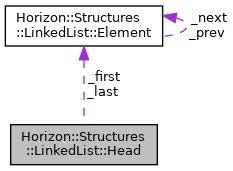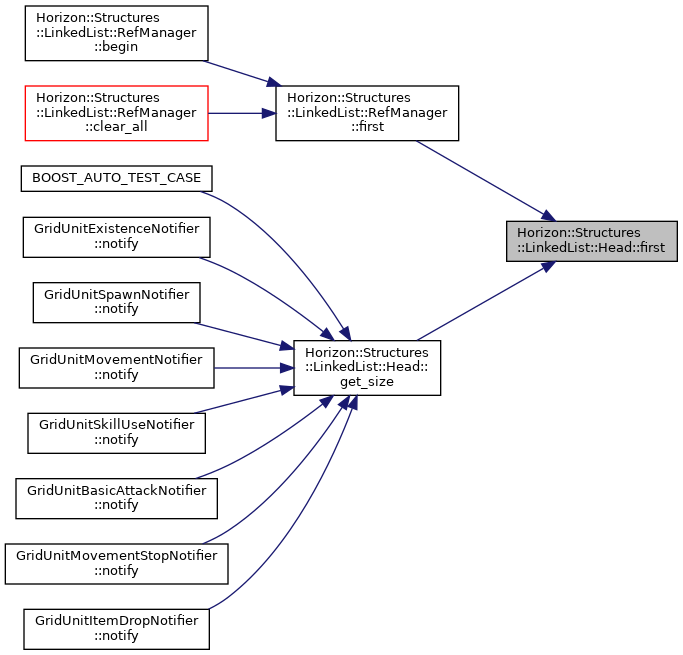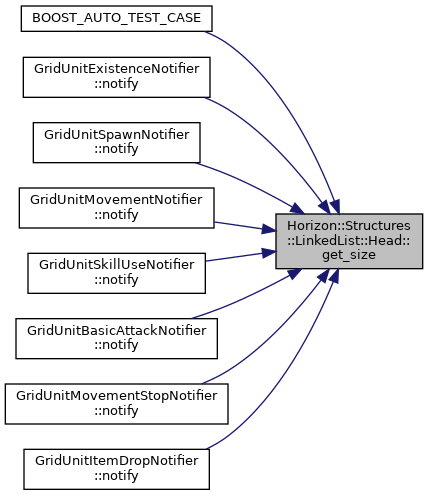LinkedList Head class. This class is used to manage a linked list of Elements. It is used as a base class for other classes that need to manage a linked list. It is not intended to be used directly. More...
#include <Head.hpp>
 Inheritance diagram for Horizon::Structures::LinkedList::Head:
Inheritance diagram for Horizon::Structures::LinkedList::Head: Collaboration diagram for Horizon::Structures::LinkedList::Head:
Collaboration diagram for Horizon::Structures::LinkedList::Head:Classes | |
| class | Iterator |
Public Types | |
| typedef Iterator< Element > | iterator |
Public Member Functions | |
| Head () | |
| bool | is_empty () const |
| Returns true if the list is empty. More... | |
| Element * | first () |
| Returns the first Element in the list. More... | |
| Element const * | first () const |
| Element * | last () |
| Returns the last Element in the list. More... | |
| Element const * | last () const |
| void | push_front (Element *pElem) |
| push_front() and push_back() are used to add an Element to the list. More... | |
| void | push_back (Element *pElem) |
| uint32_t | get_size () const |
| returns the number of Elements in the list (not including the head and tail Elements or the first and last Elements) More... | |
| void | inc_size () |
| void | dec_size () |
Protected Member Functions | |
| ~Head () | |
Private Member Functions | |
| Head (Head const &)=delete | |
| Head & | operator= (Head const &)=delete |
Private Attributes | |
| Element | _first |
| Element | _last |
| uint32_t | _size |
Detailed Description
LinkedList Head class. This class is used to manage a linked list of Elements. It is used as a base class for other classes that need to manage a linked list. It is not intended to be used directly.
Member Typedef Documentation
◆ iterator
Constructor & Destructor Documentation
◆ Head() [1/2]
|
inline |
References _first, _last, Horizon::Structures::LinkedList::Element::_next, and Horizon::Structures::LinkedList::Element::_prev.
◆ Head() [2/2]
|
privatedelete |
◆ ~Head()
|
inlineprotected |
Member Function Documentation
◆ dec_size()
◆ first() [1/2]
|
inline |
Returns the first Element in the list.
References _first, Horizon::Structures::LinkedList::Element::_next, and is_empty().
Referenced by Horizon::Structures::LinkedList::RefManager< TO, FROM >::first(), and get_size().
 Here is the call graph for this function:
Here is the call graph for this function: Here is the caller graph for this function:
Here is the caller graph for this function:◆ first() [2/2]
|
inline |
References _first, Horizon::Structures::LinkedList::Element::_next, and is_empty().
 Here is the call graph for this function:
Here is the call graph for this function:◆ get_size()
|
inline |
returns the number of Elements in the list (not including the head and tail Elements or the first and last Elements)
References _size, first(), and Horizon::Structures::LinkedList::Element::next().
Referenced by BOOST_AUTO_TEST_CASE(), GridUnitExistenceNotifier::notify(), GridUnitSpawnNotifier::notify(), GridUnitMovementNotifier::notify(), GridUnitSkillUseNotifier::notify(), GridUnitBasicAttackNotifier::notify(), GridUnitMovementStopNotifier::notify(), and GridUnitItemDropNotifier::notify().
 Here is the call graph for this function:
Here is the call graph for this function: Here is the caller graph for this function:
Here is the caller graph for this function:◆ inc_size()
◆ is_empty()
|
inline |
◆ last() [1/2]
|
inline |
Returns the last Element in the list.
References _last, Horizon::Structures::LinkedList::Element::_prev, and is_empty().
Referenced by BOOST_AUTO_TEST_CASE().
 Here is the call graph for this function:
Here is the call graph for this function: Here is the caller graph for this function:
Here is the caller graph for this function:◆ last() [2/2]
|
inline |
References _last, Horizon::Structures::LinkedList::Element::_prev, and is_empty().
 Here is the call graph for this function:
Here is the call graph for this function:◆ operator=()
◆ push_back()
|
inline |
- Parameters
-
pElem The Element to add to the list.
- Note
- The Element must not already be in a list.
References _last, and Horizon::Structures::LinkedList::Element::push_before().
 Here is the call graph for this function:
Here is the call graph for this function:◆ push_front()
|
inline |
push_front() and push_back() are used to add an Element to the list.
- Parameters
-
pElem The Element to add to the list.
- Note
- The Element must not already be in a list.
References _first, and Horizon::Structures::LinkedList::Element::push_after().
Referenced by BOOST_AUTO_TEST_CASE().
 Here is the call graph for this function:
Here is the call graph for this function: Here is the caller graph for this function:
Here is the caller graph for this function:Member Data Documentation
◆ _first
|
private |
Referenced by first(), Head(), is_empty(), and push_front().
◆ _last
|
private |
Referenced by Head(), is_empty(), last(), and push_back().
◆ _size
|
private |
Referenced by dec_size(), get_size(), and inc_size().
The documentation for this class was generated from the following file:
- src/Core/Structures/LinkedList/Head.hpp













